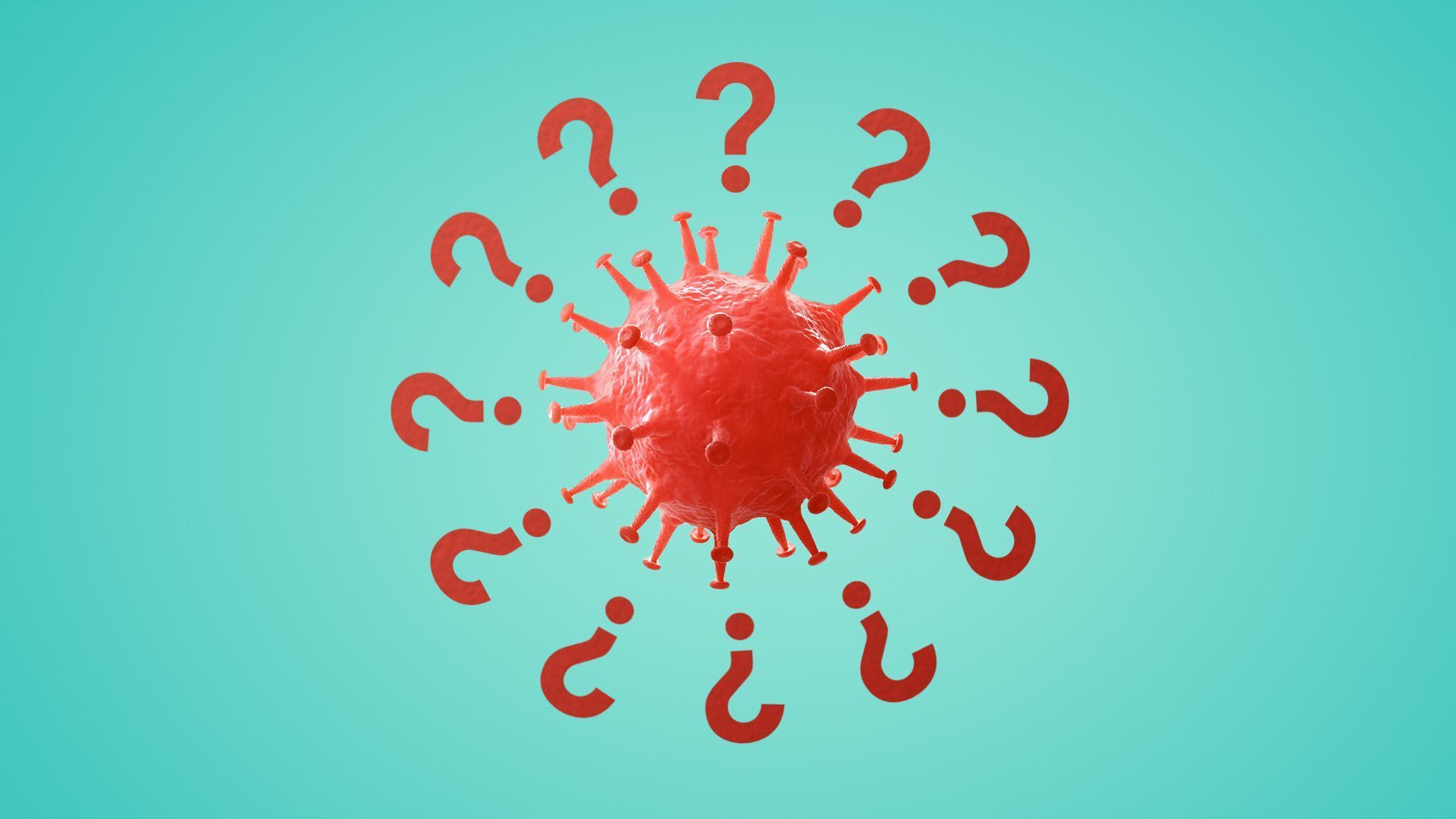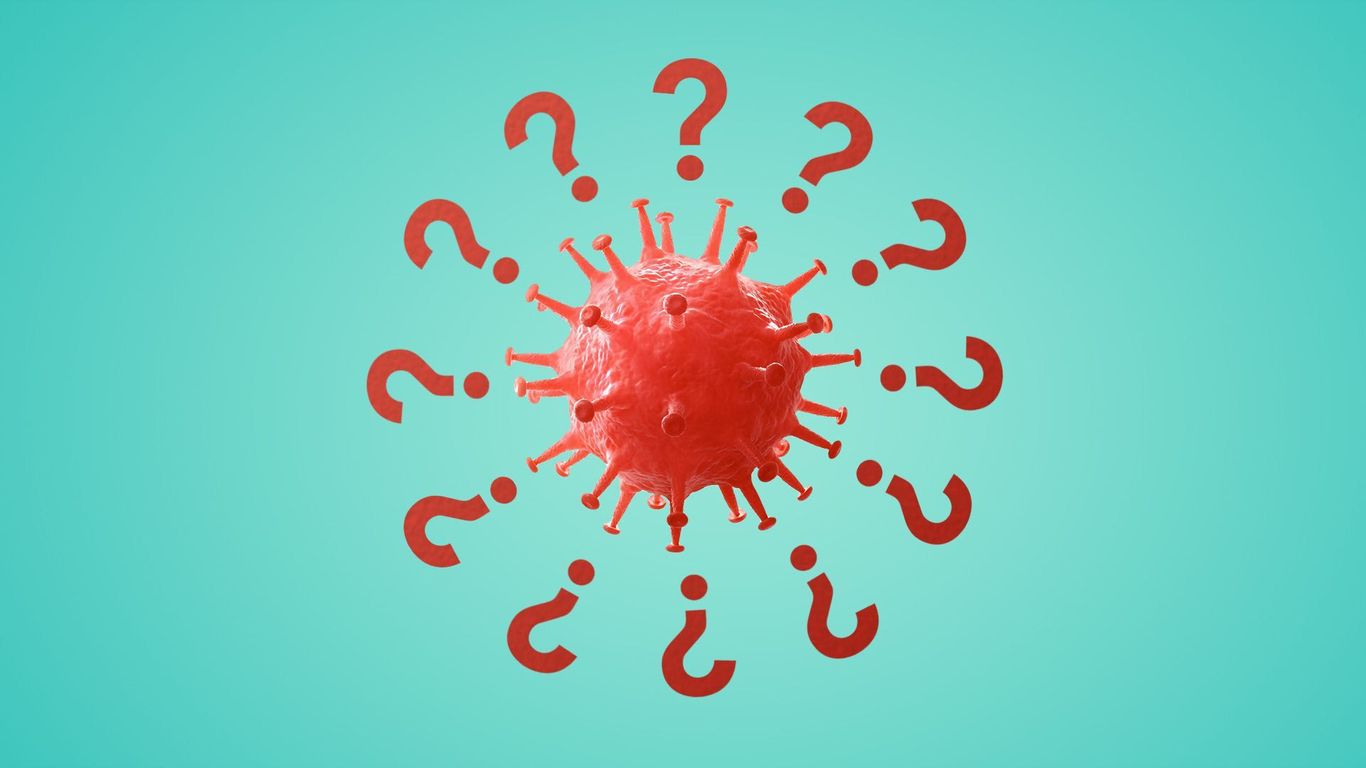
Illustration: Aïda Amer/Axios
The inability to pin down COVID's origins has opened the door to politically charged speculation and fierce debate, but without concrete evidence, people are forming narratives based on incomplete information with major geopolitical consequences.
Why it matters: The lingering questions about how the virus emerged could likely only be filled through intelligence or new information gathered from Wuhan, China, in the early days of the pandemic.
- Some experts say the debate over whether the virus jumped from animals to humans or spread after a lab accident detracts from developing measures that could help prevent both scenarios from occurring in the future.
Driving the news: The Department of Energy recently concluded — with "low confidence" — that the virus most likely originated from a lab leak, the Wall Street Journal reported on Sunday.
- "The FBI has for quite some time now assessed that the origins of the pandemic are most likely a potential lab incident in Wuhan," FBI director Christopher Wray said this week on Fox News, articulating his own agency's independent assessment.
- They are two of a small group of federal agencies assessing the possibility the virus came from lab research in China. The National Intelligence Council and four unnamed agencies have concluded with low confidence that it is more likely to have naturally jumped from an infected animal to humans, per the WSJ.
State of play: The debate boils down to whether it's more likely the virus spread from infected animals — such as at a live market in Wuhan to people at and around the market — or that researchers at a laboratory in Wuhan accidentally became infected with a virus being studied and then spread it to others.
- Supporters of each theory say the other has at least one gaping hole, although leading scientists generally find the "natural" origin theory involving animals more likely, based on the current evidence.
- But the key information to settle this debate isn't likely to come from studying the virus more or re-analyzing information that's already publicly available.
- And some experts say it's likely the missing evidence — if it ever existed — will never be found.
Details: Supporters of the live animal market origins theory argue that, similar to the first SARS pandemic in 2003, COVID jumped from infected animals held at the Huanan Seafood Wholesale Market to humans at the end of 2019.
- Evidence for this theory was published in two papers last July in the journal Science, and placed some of the earliest human cases close to a section of the market where vendors of live wild animals congregated and where environmental samples positive for the virus were clustered.
- But the theory is missing a key datapoint: samples from infected animals themselves, which proponents say may not exist after the market and surrounding farms were cleared.
- "As soon as that link to the market was recognized, the market was shut down, the animals were removed … no samples were collected to our knowledge, and the market has not reopened," said Angela Rasmussen, a virologist at the University of Saskatchewan and an author of one of the Science studies.
- Another key piece of missing information is who the earliest infected human cases were and who they were in contact with, Jesse Bloom, a virologist at the Fred Hutchinson Cancer Center, told Axios in an email.
The other side: Lab-leak proponents argue Wuhan is a known international hub of coronavirus research, and there were earlier signs of biosafety problems at the Wuhan Institute of Virology.
- The major hole in this case, however, is that there's no known evidence that a lab in Wuhan had a virus that could have been the precursor to SARS-COV-2, critics say.
- "If one of those labs had a precursor virus, that would probably change my view entirely," Rasmussen said.
- "The FBI or the CIA might have the possibility of using clandestine methods to sort of suss out what these labs have in their collections, but so far, these labs have continued to do work and publish and it doesn't make a lot of sense that they would be sitting on something huge and there wouldn't be any evidence at all," she said.
Scientists also haven't ruled out direct infection from bats, either naturally or in the course of gathering samples for labs. Bloom says all of these scenarios are plausible.
The big picture: Despite all of the furor over the last week, there isn't any new data that's been made public.
- "I think there is never going to be definitive truth, because either the samples are no longer available or the Chinese government has squelched anything and everybody involved in what people think happened," said Cornell University virologist John Moore.
- Still, Bloom says more could be learned without the cooperation of the Chinese government, including from intelligence information, interviews with doctors, journalists and citizens who were in Wuhan in late 2019, and data shared between Chinese scientists and their collaborators in the U.S.
- "So all we have is speculation, and it's the usual politicization of the few facts that are available," Moore added. "Given conflicting information, people can choose what they want to believe."
Beijing maintains it is being "open and transparent" in the search for COVID's origins, and has pointed the finger back at the U.S. But a World Health Organization investigation in the country raised concerns that investigators weren't given enough access to data and samples.
- A declassified report from the Office of the Director of National Intelligence released in 2021 suggested that more cooperation from China will be required to determine the origins of the virus. "The [intelligence community] judges that closing persistent information gaps on the origins of COVID-19 is very likely to require greater transparency and collaboration from Beijing," the authors write.
What we're watching: The standoff points to a need to better mitigate the risks posed by both zoonotic diseases that jump from other animals to humans and lab accidents.
- Better governance could also help to stave off another highly politicized debate around a pandemic or outbreak in the future.
Source: Read Full Article
